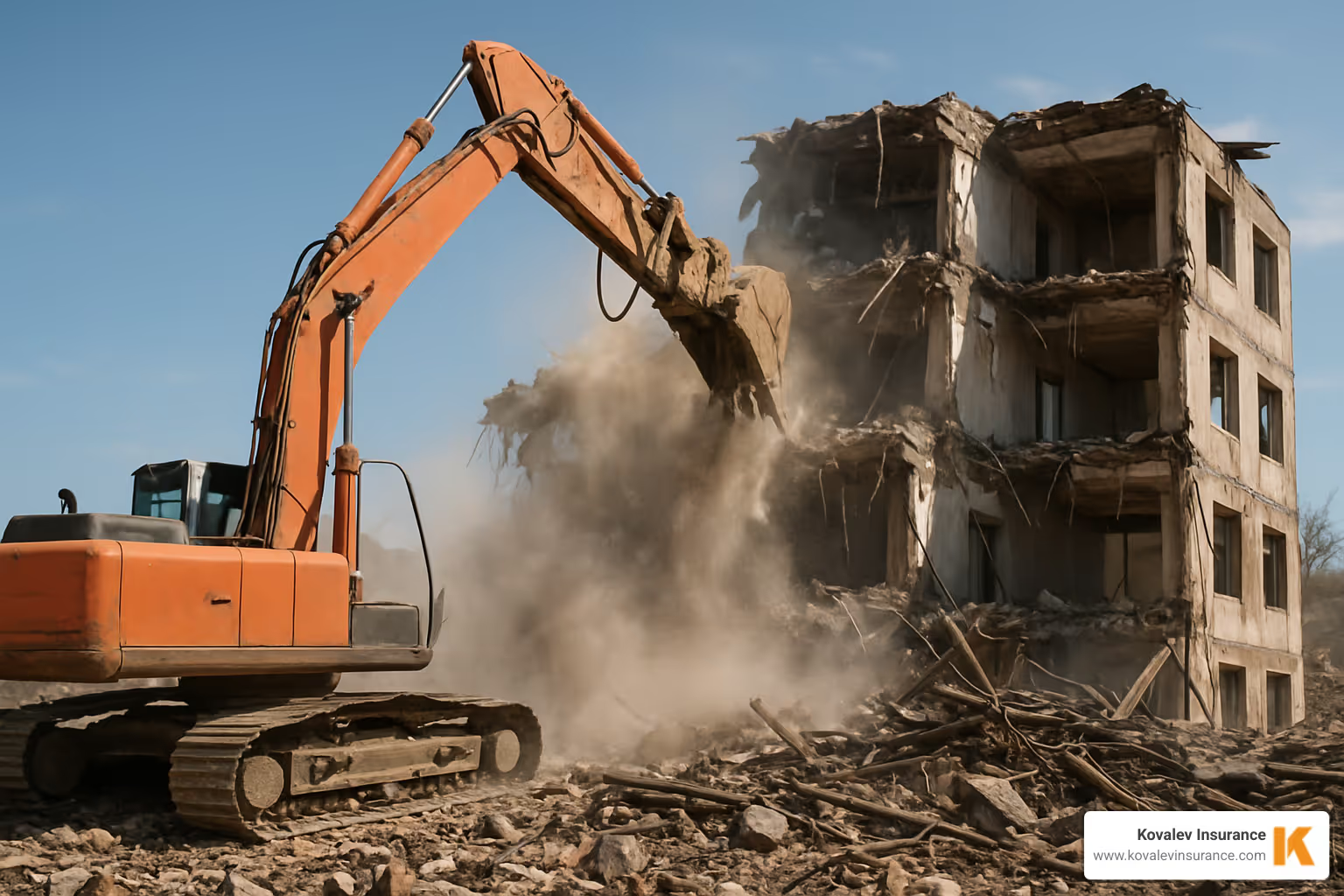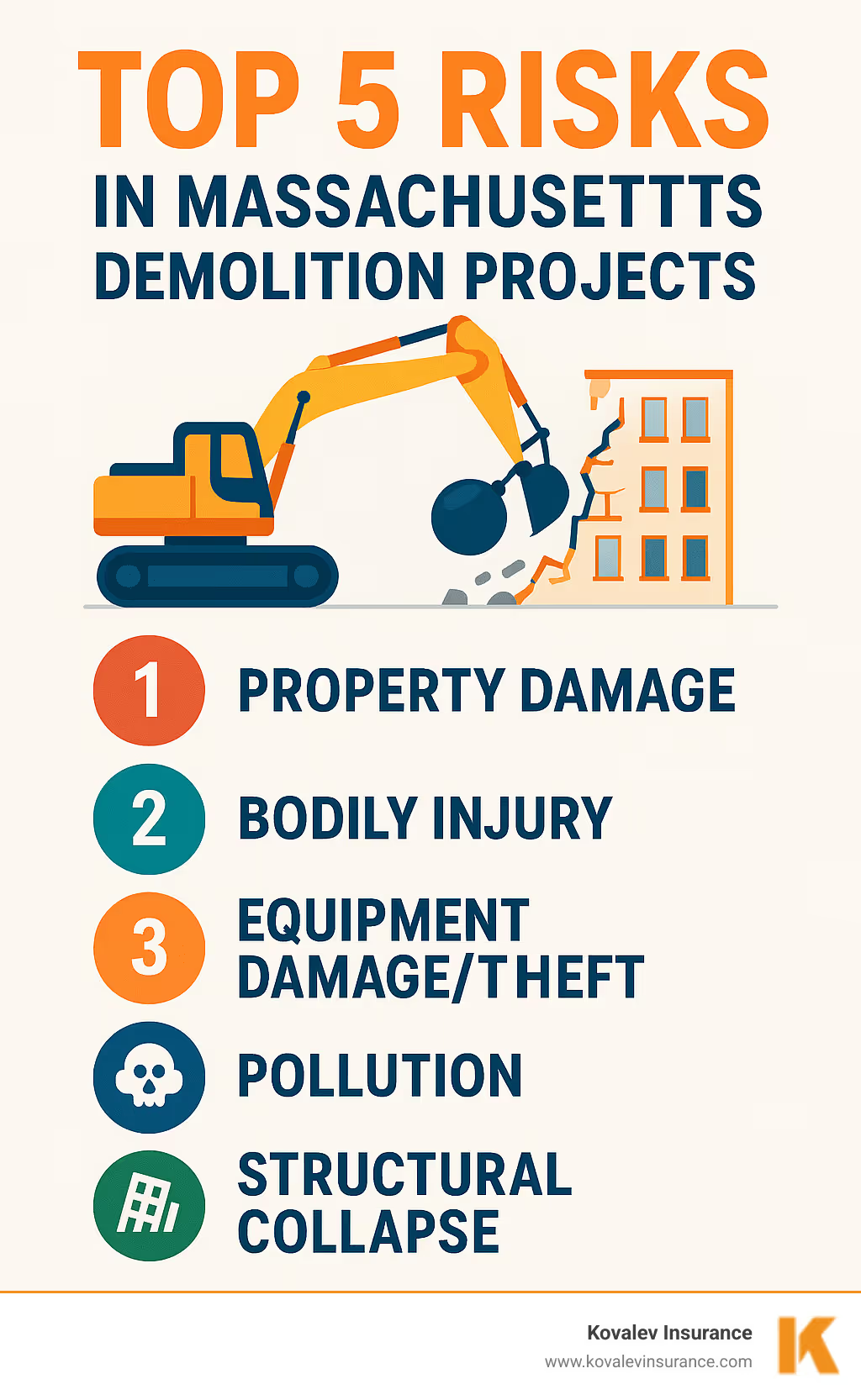Blog Content
5
Aug
2025

Demolition in Massachusetts is on a fast-track. From Boston’s skyline to smaller communities like Newton, Wellesley, and Natick, older structures come down every day to make room for new development. That steady work also brings steady exposure to costly accidents.
Demolition contractor insurance is a purpose-built safety net. In one policy package it can pay for third-party injuries, damage to neighboring properties, stolen equipment, or an unexpected asbestos release. Without it, one incident in a dense neighborhood could easily bankrupt even a well-run demolition crew.
At Kovalev Insurance we pair local insight with industry expertise to build policies that fit your exact operation—nothing more, nothing less. Below is a quick look at the biggest risks Massachusetts demolition contractors face and how the right coverage keeps those risks from stalling your business.

Running a demolition crew means juggling explosives, heavy equipment, and hidden hazards in tight New England neighborhoods. Demolition contractor insurance bundles the protection you need into one streamlined program—far more targeted than a basic business policy.
Massachusetts contractors work around high-value real estate, aging buildings full of lead or asbestos, and narrow city streets packed with foot traffic. One misstep can trigger six-figure medical bills or property claims. With specialized insurance, those costs shift from your balance sheet to the insurer’s.
If your crew swings a hammer to knock down walls anywhere from Brookline to Belmont, you’re in the right place to secure custom protection.

Think of insurance like a building: a strong foundation first, then add-ons as needed. For demolition companies that foundation is usually three policies.
Covers injuries or property damage you cause to others—debris cracking a neighbor’s window in Natick, for example. It also pays for your legal defense. Most Massachusetts contracts call for at least $1 – $2 million per occurrence. More info about General Liability Coverage in Massachusetts
Old buildings hide asbestos, lead, and PCBs. Pollution coverage funds cleanup, medical claims, and legal fees if contaminants escape during a job in Belmont or Wellesley. Scientific research on mesothelioma
Pays for accidents involving your trucks plus theft or damage to excavators, skid steers, and tools moving from site to site. Top Inland Marine Insurance Coverage in Massachusetts

Premiums are an investment—one claim can wipe out years of profit. In Massachusetts, most demo contractors spend $1,500 – $10,000 per year for a full package (liability, pollution, equipment, auto, workers’ comp). A stand-alone $2 million CGL averages about $200 a month.
Smart ways to save include safety training, higher deductibles, and bundling multiple policies with one carrier. Ways To Reduce Cost Of Artisans Insurance

Got questions about demolition contractor insurance? You're in good company! It's a complex world, but understanding the basics can give you so much peace of mind. Let's tackle some of the most common questions we hear from contractors just like you here in Massachusetts.
This is a fantastic question and one we hear often. Generally speaking, your demolition contractor insurance policy is designed to cover your direct employees and the work you perform. It typically does not extend to cover subcontractors you bring onto a project. Think of it this way: each professional should be responsible for their own safety net.
This means that if a subcontractor causes an accident, damage, or injury while working for you, their insurance should be the one to step up, not yours. That's why it's absolutely crucial to always require your subcontractors to carry their own comprehensive coverage. Before they even set foot on your job site, ask them for a Certificate of Insurance (COI). This document proves they have the necessary General Liability, Workers' Compensation (if they have employees), and any other relevant policies.
Beyond just verifying their coverage, it's also smart to include hold harmless agreements in your contracts with subcontractors. These agreements legally require them to protect and indemnify you against claims that come from their work. And for an extra layer of protection, ask them to add your company as an additional insured on their liability policies. This way, you get some protection under their insurance for claims related to their specific work.
Ah, the classic "debris hitting the car next door" scenario, or worse! In densely populated areas like Brookline, where buildings are practically neighbors, the risk of property damage to surrounding structures is very real. The good news is, this is exactly what your Commercial General Liability (CGL) coverage is for.
If your demolition work causes damage to a neighboring property – whether it's a cracked foundation from vibrations, debris damaging a roof, or even a misplaced dust cloud causing issues – you need to contact your insurance company right away. Prompt notification is key, as delays can sometimes affect your coverage.
Your CGL policy is designed to cover the costs of repairing or replacing the damaged property, up to your policy limits. This includes direct physical damage as well as any resulting loss of use for the property owner. And here's a huge benefit: if the property owner decides to file a lawsuit, your insurance company will typically provide for your legal defense. This means they'll cover attorney fees, court costs, and other legal expenses, which can really add up, even for seemingly minor incidents. Your insurer will also investigate the claim thoroughly to figure out the cause and confirm it's covered under your policy.
Your excavators, bulldozers, and specialized tools are the lifeblood of your demolition business. They represent a huge investment, and losing them to theft or damage can bring your operations to a grinding halt. While your Commercial General Liability policy protects you against claims from third parties, it generally does not cover your own tools and equipment.
For that vital protection, you'll need specialized coverage like Inland Marine Insurance or an Equipment Floater policy. These types of coverages are specifically designed to protect your valuable assets. They cover things like theft of equipment from job sites (yes, even in secure areas!), damage from fire, flood, or vandalism, and other covered perils.
Unlike standard Commercial Property Insurance, which usually only covers items at a specific address, Inland Marine and Equipment Floater coverage follows your tools and equipment wherever they go. This is absolutely crucial for demolition contractors in Massachusetts, who are constantly moving heavy machinery between job sites in places like Newton, Wellesley, or Natick. Plus, these policies often offer replacement cost coverage, meaning you'll get enough money to replace your damaged or stolen equipment with new items of similar quality, rather than just their depreciated value. It's truly a must-have for any demolition pro!
Demolition across Massachusetts is booming, and so are the risks. A single uninsured mishap on a crowded Newton street could cost more than decades of premium payments.
Kovalev Insurance crafts policies that match your work—whether you handle small residential teardowns in Natick or multi-story projects in Boston. Our local knowledge means we factor in tight property lines, strict permitting rules, and high asset values unique to the Commonwealth.
Ready to fortify your business? Get your personalized Artisan Contractors Insurance quote today and keep your crew focused on safe, efficient demolition while we handle the coverage.
X